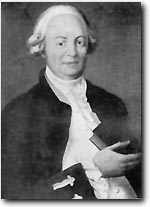 Trediakovsky Vasily Kirillovich (1703 - 1769), poet, prose writer, theorist. Trediakovsky Vasily Kirillovich (1703 - 1769), poet, prose writer, theorist.
Trediakovsky was one of the writers who determined the development of the Russian literature of the XVIII century - the century, which paved the way for "Golden Age of Russian literature".
Trediakovsky was born in a family of Astrakhan priest, studied at school of Capuchin monks and was to enter the Church. But science, not religion, attracted him. He ran away from parents' house and went to Moscow. There he entered Slavic-Greek-Latin academy, but soon, attracted by the same thirst for knowledge, went abroad -absolutely without money, hoping only on his talent and "keen mind". About two years Trediakovsky spent in Holland, after it he went to France, to Sorbonne on foot - from Hague to Paris.
Having returned home, he made his debut by translation of the French novel under name "Travel to Island of Love " - and at once incurred universal displeasure for obscene sensuality of the novel. However Trediakovsky became well known, both his erudition and literary talent were noticed. Anna Ioannovna granted Trediakovsky the dignity of the court poet, and in 1733 he was taken on the staff with the Academy of Sciences as secretary. In 1745 Trediakovsky became the first Russian professor. Before Trediakovsky among professors of the Academy of Sciences there had been only invited to Russia foreigners, and they, to put it mildly, didn't like such progress of Russian "upstart". Trediakovsky tried to struggle against intrigues, but, nevertheless, was dismissed from the Academy in 1759. However, he continued to work for the benefit of Russian science.
Little by little he put out the translation of works of Sorbonne professor S.Rellen: ten volumes of "Ancient history" and sixteen volumes of "Roman history", and also 'Stories about Roman emperors" by Z.-B. Krevye. The largest literary work by Trediakovsky became "Telemahida" - exposition of the novel "Adventures of Telemak" by a French writer Fenelon. "Telemahida" incurred displeasure of then reigning Catherine II (these events began in 1766), the imperial anger was followed by disfavour.
Trediakovsky was among the reformers of Russian system of versification. In 1735 he wrote the treatise "The new and short way for composing of Russian verses". The syllabic system of versification was used at that time. A basis for it was equalizing of number of syllables in each of lines of a poem. The syllabic system used rhyme, but did not take in account word stresses. Trediakovsky asserted, that the syllabic system was suitable only for languages, in which words had fixed stresses. In Russian language the stress was mobile. Hence, concluded Trediakovsky, the syllabic system mutilated Russian poetry. He proposed to introduce elements of tonic system of versification, it was based on alternation of stressed and unstressed syllables. Such system of versification he named syllabic-tonic. But, to tell the truth, he limited the application of syllabic-tonic system only to verses with a large number of syllables in a line - there should be 11 or 13 syllables. The small number of syllables, in his opinion, could be organized according to the syllabic rules.
In the treatise he also spoke about application of poetic meters, it was the consequence of introduction of syllabic-tonic system. Trediakovsky believed, that the main meter of Russian poetry should be trochee. Iambus for Russian poetry he considered to be of little use, trisyllabic meters he excluded at all. In 1755 another important work by Trediakovsky: "About ancient, middle and new Russian poetry" saw the light of the day. It was the first work on the history of Russian poetry. As it follows from the name, Trediakovsky distinguished three stages of versification development. The first - he called it "pagan" - the most ancient, is characterized by dominance of tonic versification system (it is the closest to national poetic creativity). The second stage - from the XVII up to the beginning of the XVIII century - dominance of syllabic system. And at last, the third - modern - should affirm syllabic-tonic system.
Works of Trediakovsky, really, as was mentioned above, defined the ways of Russian literature development. But life of Trediakovsky lasted longer than recognition and glory. He died in severe poverty on August 6, 1769.
|













 Culture and Art
Culture and Art  Literature
Literature  XVIII century literature
XVIII century literature